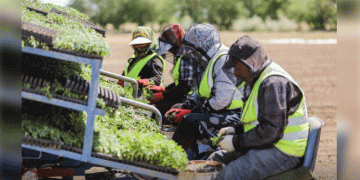Astrakhan’s agricultural sector is setting new records, thanks in large part to the diligent efforts of migrant workers from Uzbekistan. This partnership is a shining example of the effective implementation of migration policy in the region. The dedication of workers and well-organized working conditions played a key role in making Astrakhan the leader in crop production in Russia.
A striking example in this success story is the Astrakhan Agricultural Production Complex (AIC Astrakhan), which has been attracting seasonal workers from Uzbekistan for several years. This farm-to-fork enterprise employs more than 1,000 people, 400 of whom are citizens of Uzbekistan. These workers consistently praise the organized work environment and quality of living conditions provided.
The management of the Astrakhan agro-industrial complex highly appreciates the discipline and reliability of migrant workers, which ensures the satisfaction of all labor needs in greenhouses and fields. This allowed the plant to operate at full capacity. The Astrakhan agro-industrial complex, located in the Kharabalinsky district, is a responsible investment project that includes a tomato paste production plant with a processing capacity of 5,000 tons of tomatoes per day. Its modern greenhouse complex occupies 9.7 hectares of seedling production, and the fields occupy 4.5 thousand hectares, where special hybrid varieties of tomatoes are grown with an average yield of more than 90 tons per hectare.
Dmitry Belyaev, chief technologist of the Astrakhan agro-industrial complex, spoke about the company’s recent cooperation with a Russian seed producer on the selection of domestic hybrids suitable for the production of tomato paste. This initiative aims to reduce dependence on foreign seeds and achieve the broader goal of import substitution.
This year, the Astrakhan agro-industrial complex received more than 60 million rubles of state support for crop production activities, the regional Ministry of Agriculture and Fisheries reported. The demand for domestically produced tomato paste remains high, which determines plans to build a similar enterprise in the Krasnoyarsk region, which is also recognized as an important investment project. The first production line of the new plant is expected to be operational by 2024.
Governor of the Astrakhan region Igor Babushkin emphasizes that stimulating and supporting investment activity is vital for the economic growth of the region, and close attention continues to be paid to this area.
In conclusion, the agricultural achievements of the Astrakhan region highlight the importance of a skilled migrant workforce and well-managed agricultural practices. Strategic cooperation with Uzbek workers and the desire to use domestic resources ensure the region’s continued leadership in the Russian agricultural sector.
- Latest
- Trending































